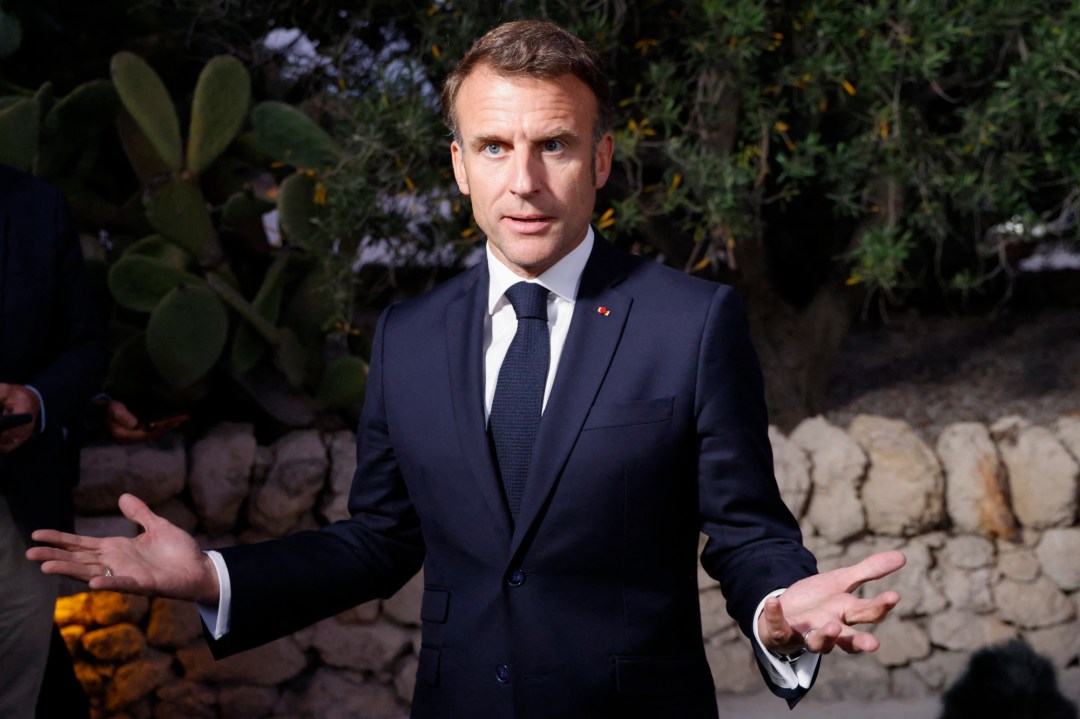France is taking the place of Italy, it seems, as the basket case of Europe. The turn-over of prime ministers in France – five now since the start of President Emmanuel Macron’s second term in 2022 – is worse even than Italy has ever managed.
Since the fall of fascism in 1945 Italy has notoriously had 69 governments – roughly one a year – which has made governing a tricky people even trickier. But France has had nearly two a year of late.
That France is now, in the words of Marine Le Pen, ‘the sick man of Europe’, is especially pleasing to Italians.
Macron, who refuses to step down as President, or call another snap parliamentary election, presides over a political system in a state of paralysis and a country bracing for serious social unrest.
By contrast, the government of Italy’s first female prime minister, Giorgia Meloni, who has been in power for nearly three years, looks as safe as houses. Yes, there are frequent strikes in Italy but they are insipid affairs that remind me of those who go through the motions of attending church but no longer believe in God.
Neither the French parliament, nor the French it seems, are prepared to accept the spending cuts required to tackle the escalating public debt of their country. ‘Tax the rich!’ they shout. Three quarters of the French want a wealth tax on top of existing taxes, according to one recent poll. Yet France already has one of the highest tax to GDP ratios in the developed world.
As out-going prime minister, François Bayrou, warned MPs before he lost Monday’s confidence vote on his austerity budget: ‘You have the power to bring down the government, but you do not have the power to erase reality. Reality will remain relentless: spending will continue to rise, and the burden of debt, already unbearable, will grow heavier and more costly.’
Once again, ‘la France s’ennuie’ as in the mid-19th century when this famous political leitmotif was coined by the poet and politician Alphonse de Lamartine to encapsulate a national mood of primeval soup-like lassitude from which would erupt a revolutionary fervour. The English word ‘boredom’ – which is what teenagers feel – fails to capture the full meaning of the French ‘ennui’ which is best left untranslated.
Just before the 1848 revolutions convulsed Europe, which in France led to the collapse of the monarchy and the foundation of the Second Republic, Lamartine repeated the phrase. France was gripped by ‘a deaf malaise’ in the deepest reaches of ‘the most serene spirits’, he added, and ‘everyone has a cloud on their brow’.
On March 1968 – just two months before the student insurrection that would engulf France – the political editor of Le Monde presciently exhumed the phrase in an article headlined ‘Quand la France s’ennuie’. It was a plea to the French to shake off the ennui and rise up.
Even students, who cared only about their human right to spend the night together, he lamented, and General Charles de Gaulle himself, as he attended another flower show, were ennuyées. But instead what France desperately needed was ‘ardour and imagination’ because ‘a country can also perish from ennui.’
Italy, meanwhile, smiles. Support for Meloni’s party, Brothers of Italy, is higher now than when it came first in the September 2022 general election. That’s almost unheard of for party in power in a western democracy. Her right-wing coalition remains rock solid.
She is already the fourth longest serving prime minister in the history of the Italian Republic and if, as seems likely, she survives another year, she will become the longest serving. Indeed, she looks set to become the Republic’s first prime minister to complete their five year mandate.
That France is now, in the words of Marine Le Pen, ‘the sick man of Europe’, is especially pleasing to Italians.
The French have always treated them as an inferior species of, at best lovable rogues or at worst despicable crooks. As indeed have the Germans.
Such condescension was nowhere more obviously on public display in recent times than in October 2011 during a joint press conference at the height of the Euro crisis held by then German chancellor Angela Merkel and then French president Nicolas Sarkozy.
The spread between Italian and German government ten-year bonds – i.e the difference between their yields (interest rates) – had reached meltdown point. The dire plight of Italy, hard on the heels of Greece, threatened to crash the Euro.
When asked by a journalist if they still had confidence in then-Italian prime minister Silvio ‘Bung Bunga’ Berlusconi there was a long pause while Merkel and Sarkozy, standing on stage at adjacent podiums, looked at each other and then smirked. It was a very public betrayal.
Even Italy’s opposition media such as La Repubblica (the Italian equivalent of the Guardian) who were Berlusconi’s sworn enemies, felt Merkel and Sarkozy were out of order to ridicule a fellow leader in this way. Less than a month later, Berlusconi felt compelled to resign.
But the French economy is now in worse shape than Italy’s, according to many key indicators.
When Meloni came to power, the yield on French government ten-year bonds was about 2 per cent – roughly half that on Italy’s. The lower the yield, the stronger the economy. Ever since, the yields on French and Italian bonds have been converging.
This week on Tuesday, in a highly symbolic moment, French borrowing costs briefly exceeded Italy’s for the first time since the introduction of the Euro when the yield on French government ten-year bonds hit 3.48 per cent compared to Italy’s 3.47 per cent.
So nowadays the markets regard the two economies as of similar reliability – an incredible turnaround. In November 2011, for instance, when Berlusconi resigned, the yield on Italy’s ten-year bonds was an incredible 7.3 per cent.
Italy’s economy, like most Eurozone economies, remains very sluggish – as does France’s. This year GDP is forecast to grow by just 0.6 per cent in both countries – but that’s still more than in Germany (0.4 per cent).
Significantly, Meloni’s government has slashed the budget deficit from 8.1 per cent when it came to power to 3.4 per cent in 2024 and forecast to fall below the EU’s 3 per cent limit in 2026. By contrast, France’s budget deficit was 5.8 per cent in 2024 and expected to fall hardly at all only to 5.6 per cent this year.
At 137 per cent, Italy’s public debt as a proportion of GDP, up from 134 per cent in 2019, is astronomically high. But it remains relatively static, whereas French public debt (the third highest in the EU) is steadily growing. It’s currently 114 per cent, up from 98 per cent in 2019.
Since Meloni came to power in October 2022, one million full time jobs have been created in Italy, by among other things cutting taxes and abolishing long-term unemployment benefit for all except those with non-working dependents.
Italy’s youth unemployment rate (those under the age of 24) is still very high at 18.7 per cent and much higher in the deep south – but in France it’s 18.5 per cent. Italy’s overall unemployment rate, meanwhile, has fallen to a historic low of 5.9 per cent –– significantly lower than the 7.5 per cent rate in France.
Meloni popularity, charm and realism contrast with Macron’s unpopularity, arrogance and chauvinism. She has become the most significant leader in the EU – an accolade no Italian prime minister before her achieved. And Italy has acquired more prestige and influence on the global stage than France for the first time in modern history.
Even if Macron is so vain that he cannot see it.
So while La France s’ennuie once again, L’Italia sorride sotto i baffi for once (smiles under its moustaches).









Comments